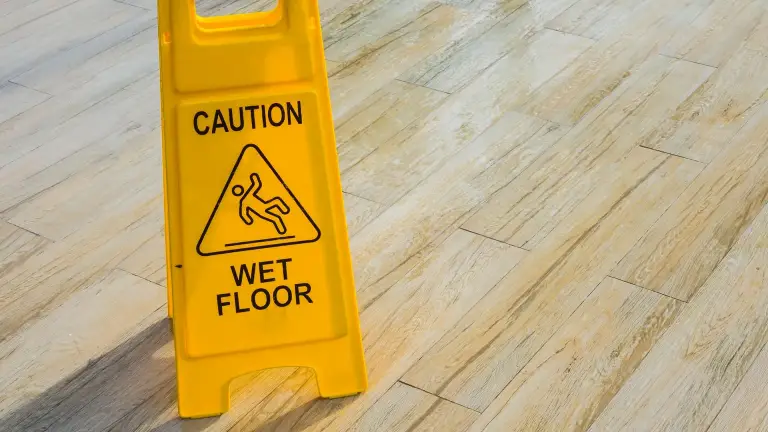Slip And Fall Injuries What You Need To Know About Slip And Fall Injury Laws In Illinois
Slip and Fall Lawyers in Chicago Illinois
Under Illinois law, slip and fall accident victims can get compensation when injured on the premises of an establishment. According to the Illinois Premises Liability Act, any person injured at an establishment owned or managed by another person can file a claim for compensation against them.
Making claims and getting compensation may seem complicated, but an experienced slip and fall lawyer can guide you through the entire process.
Most premises liability claims come in the form of:
- Falling accidents
- Elevator accidents
- Stairwell accidents
- Escalator accidents
- Swimming pool accidents
If you are looking for help with slip and fall accident cases, reach out to our team at MJB Law Chicago today. Our Slip and Fall lawyers at MJB Law Chicago can help you with your slip and fall claim matters.
Whether you are looking at a personal injury claim or a slip and fall claim against property owners, our slip and fall attorney professionals at MJB Law Chicago are there.
Illinois Slip and Fall Laws
All states allow injured persons to file claims against the establishment operating the promises on which they got hurt. However, two specific rules apply in Illinois. You need to understand these rules if you are exploring options for getting compensation for your loss.
These two important rules are:
- The statute of limitations deadline for filing a slip and fall lawsuit, and
- The Comparative Negligence rule determines if you can get any compensation if you are partly responsible for the accident.
Our legal professionals can help you with slip and fall case matters. Whether you are concerned about your medical bills due to serious injuries, your lost wages, or soft tissue injuries, remember that Chicago premises liability lawyer professionals at MJB Law are here to help you seek compensation.
The Statute of Limitations Deadline for Filing a Slip and Fall Lawsuit in Illinois
The statute of limitations is a legal concept that sets a deadline on when you can file a lawsuit within the civil court system of that state. If you file your lawsuit after that deadline and the defendant points that out to the court, the court will most likely dismiss your case. This is why you need to know how this law works in your case.
So what are the statutes of limitation on slip and fall injury cases in Illinois? Well, it is the same rule that applies to personal injury claims. (Slip and fall damage claim is under personal injury claims).
The section that applies here is 735 Illinois Compiled Statutes section 5/13-202, which says, “Actions for damages for an injury to the person…shall be commenced within TWO YEARS after the cause of action accrued” (emphasis added.)
If you happen to incur an injury on someone else’s property and want to hold the owner responsible, you need to file your claims within two years from the day the slip and fall happened.
Now, that seems as if it is a long time; the truth is that that might not be the case. It is best to talk to a lawyer as soon as you get involved in an accident due to someone else’s negligence. A lot of dragging on can occur during settlement talks, and you need to ensure you have enough time to file a slip and fall lawsuit.
There are occasions where the statute of limitations is on pause or “toll,” thereby granting you more time to prepare your case. Speak with your attorney to know if your case qualifies for such an exception.
Comparative Negligence Rules in Illinois Slip and Fall Cases
If you will hold someone responsible for your injury, be prepared for the person to deny responsibility or claim you both share responsibility for the accident. This is plain human behavior, so it is something we lawyers have come to expect in all slip and fall cases.
Here is the deal: if the defendant can prove that you are responsible for the accident, you may get little or no compensation for your loss.
Illinois “modified comparative negligence rule” is the standard for determining how much compensation you can get if the defendant can prove you share responsibility for your injuries.
Under the “modified comparative negligence rule,” the damages awarded to a personal injury plaintiff are reduced proportionally to the percentage of their responsibility for that accident. So let’s say the court decides you are 40 percent at fault for your slip and fall accident. They also award you $100,000 as damages (to cover your lost income, medical bills, and “pain and suffering”). They will subtract 40 percent of the total compensation amount, i.e., $10000 multiplied by 100 and divided by 40. In this case, the proprietor, manager, or landowner will only have to pay $60,000.
Most defendants will try to push for more than 50 percent responsibility on your end. Why? Because in Illinois, you are not eligible for any compensation if you are proven to have a degree of fault for the accident.
Even if the case doesn’t go to trial, the “modified comparative negligence rule” will still exist. The defense and their respective representatives, such as the insurance company and their attorneys, will factor in how much they stand to lose if the case goes to trial. Suppose they believe they can prove you were more than 50 percent responsible for the accident. In that case, you will get a very low settlement offer or no settlement offer at all. It is best to have an experienced slip and fall attorney while building your case.
- Some of the arguments you may hear from the defendants are:
- You were in an area where customers or visitors are not allowed or expected to be
- You were distracted or not paying attention while walking
- You wore inappropriate footwear
- You know the place was dangerous before or when you walked in
- There were signs to indicate the risks of walking around the property.
How to Prove Premises Liability Claim
Due to Illinois slip and fall injury laws. For instance, under Illinois’ Duty of Care Statute, a property owner or manager is not responsible for injuries sustained on a property with obvious dangerous conditions.
The property manager needs to prove that anyone could have seen how precarious the situation was, and they are off the hook.
- To prove you have a legitimate Premises Liability Claim, you have to show the following:
- The injury was caused by the lack of proper care of the owner of the property
- Proof of the harm/injury you sustained
- Visual evidence of the accident’s location shows the dangerous elements such as faulty floor tiles, bad lightning, broken stairs, etc.
- Collaborative accounts from eyewitnesses
- A police report of the accident
- A report by a medical institution that supports your injury claim
- A statement from the business owner stating that they could have been at fault
Get Compensated For Your Injuries And Losses
Were you in a slip and fall incident in Illinois within the last two years due to someone else’s negligence? Call our experienced Chicago slip and fall attorneys today for adequate representation, or fill out our online form.
If you require legal representation, remember that we are here to provide a free consultation today.
Our legal professionals are up to date on premises liability law and can certainly help with your premises liability case.


